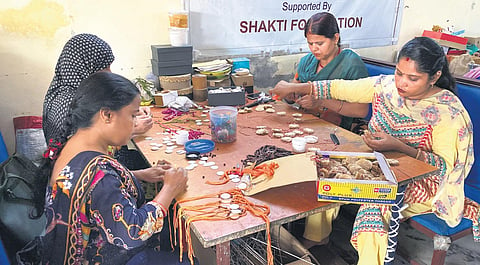

Ahead of Raksha Bandhan, which is on Thursday, Pitampura-resident Yashita Gupta has decided that this time around, she will steer clear from mainstream Rakhi designs. In fact, the rakhi she has bought for her brother has been crafted using natural and eco-friendly elements by tribal women—under a project run by The Art of Living, a volunteer-run non-profit organisation. “The rakhi is plantable. It is created in a simple manner but is usable. I also have a lot of faith in the project and the cause that they are supporting,” shares the 22 year old.
Gupta is among the many individuals who have decided to make a green switch this year by opting for eco-friendly rakhis. Various homegrown businesses and small organisations have been innovating with a range of materials—bamboo, seeds, cotton, pulses, etc.,—used to handcraft rakhis that are not only environment friendly but also one of a kind.
For a better tomorrow
Over the years, Noida resident Nanu Gupta often witnessed how, post Raksha Bandhan festivities, the rakhis would be submerged in a river or a well by the women of the family who would also offer prayers for the long lives of their sons. However, this simple annual tradition also made her question the impact it had on the environment. “Those rakhis were made of synthetic products—there would be plastic beads and threads, which would not decompose. I also realised that I am not the only one performing the tradition, so the amount of waste being created was insurmountable,” says the 25 year old. The founder of a one-person company Handcrafto, Gupta has been crafting rakhis made using crochet, jute, and even plantable options (price starts at Rs 199).
Similarly, BeAbhika.com, a venture founded by North Campus-based Madhulika Anchalia and Abhishek Bardia in 2016, is offering rakhis made using air-dried clay, comprising seeds—starting at Rs 215. The paint used on these rakhis is chemical-free. “We wanted to give people an option to buy something that is eco-friendly and creates minimal waste,” says Anchalia.
Get, set, upcycle
Used usually during the festivities, rakhis end up being part of the landfill when not submerged in a waterbody as part of a ritual. In either case, it contributes to plastic pollution. Nirmalya—a city-based organisation that recycles waste flowers from temples into incense sticks—has been using discarded fabrics to create rakhis. “Our rakhis are made from cloth that has been used to dress up deities. Since the cloth is synthetic, we use it to create rakhis that are multifunctional,” shares Surbhi Bansal, co-founder. Their rakhis—starting at Rs 399, can be used curtain holders, decorative items, bookmarks, etc., once the merriment is over.
All for a cause
City-based social enterprise Gulmeher has been working with the women's community from the Ghazipur landfill and helping them slowly transition from being waste-pickers to artisans. Founded by Anurag Kashyap, this 2013 organisation focuses on producing sustainable products while supporting the livelihoods of these women. This year, these craftswomen have created a series of designs using pressed flowers and leaves—some are embedded with a seed and can be planted in the soil later. These products are also packaged sustainably, without using any tape or adhesive. “We are running out of time. We don’t have a choice. Shifting to sustainable options is something that we should do sooner or later. This way, all of us need to do our bit to protect the environment,” concludes Kashyap.